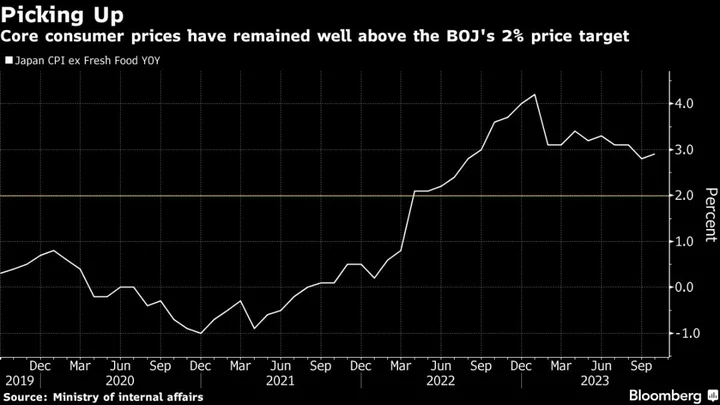Japan’s key inflation measure accelerated for the first time in four months, going against the Bank of Japan’s view that it will decelerate, likely strengthening expectations of policy normalization.
Growth in consumer prices excluding fresh food inched up to 2.9% in October from 2.8% in September, staying above the BOJ’s 2% goal for a 19th month, according to the ministry of internal affairs Friday. The median forecast of economists was a jump to 3% amid a reduction of government subsidies for utilities.
The impact from those subsidies on overall inflation shrank to 0.49 percentage point from 0.98 in September. Hotel prices also helped boost prices thanks to a continued recovery in inbound spending.
BOJ Governor Kazuo Ueda appears to be facing persistent inflationary pressures that are at odds with his reiterated assertion that a drop in import prices will cool inflation in the short term. A higher cost of living is already taking a toll on consumer spending, and it helped shrink the economy last quarter in a sign there would be risks for monetary policy normalization, putting Ueda in a tough spot for deciding whether he should move on policy.
With approval ratings at the lowest level in his two-year premiership partly due to inflation, Prime Minister Fumio Kishida unveiled an economic package worth more than ¥17 trillion ($115 billion) earlier this month. In it, the premier extended subsidy programs to contain energy prices until April, and decided to give tax rebates and cash handouts to support households hit by rising prices.
What Bloomberg Economics Says...
“Rising living costs are squeezing household spending power – and reducing prospects for the durable, demand-led inflation the Bank of Japan seeks.”
— Taro Kimura, economist
For the full report, click here
Excluding fresh food and energy, consumer prices climbed 4% from the previous year last month, hovering around the highest level since 1981, according to the ministry.
A weak yen has been a key driver behind high import costs, as it has stayed near a 33-year low against the dollar in recent months. This month Ueda has been frequently pressed by opposition party members in parliament to admit that monetary easing is causing the yen’s fall, exacerbating the inflationary hit on households.
(Updates with more details from report)

